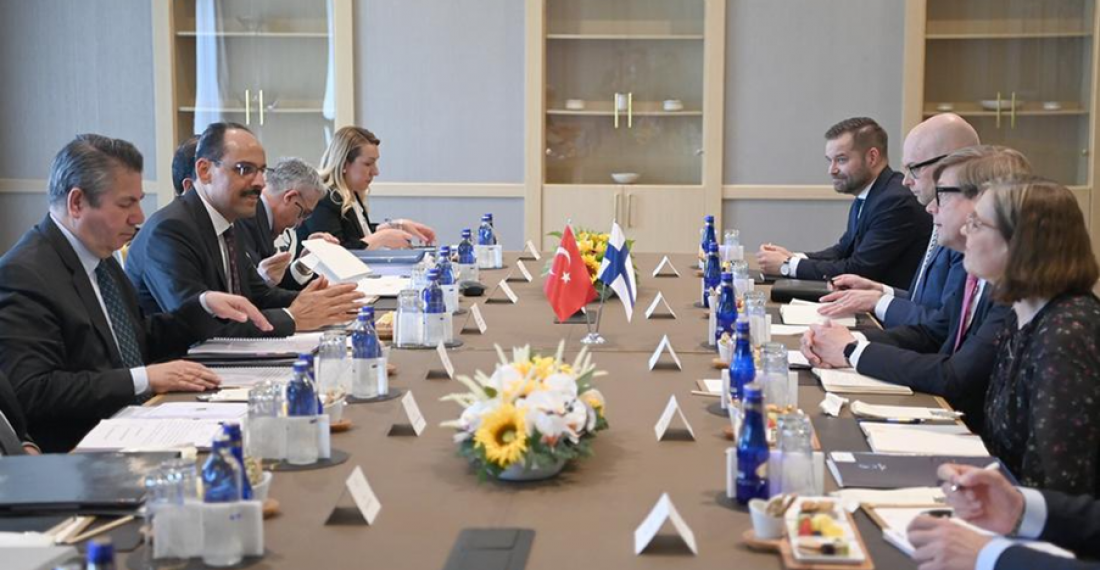Senior Turkish officials have met with government delegations from Sweden and Finland as discussions continue following Ankara's threat to veto the NATO membership application of the two Nordic countries. Most NATO countries have warmly welcomed the decision of Sweden and Finland since their membership in NATO will considerably strengthen the northern flank of the alliance, but Turkey accuses both countries of having an ambivalent position on Turkey's struggle with militant Kurdish groups.
On Wednesday, Swedish and Finnish government delegations travelled to Ankara to meet with Turkish representatives in an effort to resolve the country’s doubts regarding their accession to NATO. In their first face-to-face meeting since the two Nordic countries applied for membership, Turkish representatives stressed their security concerns, and conditions regarding Sweden’s “cooperation” with Kurdistan Workers’ Party (PKK).
Turkish presidential spokesperson Ibrahim Kalin said in a statement late on Wednesday that positive steps towards the lifting of an arms embargo from Finland and Sweden had been taken. In October of 2019, Sweden and Finland were among some European states that imposed an arms embargo on Turkey following a military incursion into Syria against the People’s Defence Unit (YPG), a mostly Kurdish militia that forms part of the Syrian Democratic Forces.
Sweden and Finland officially applied to become members of NATO on Wednesday last week. Turkey shocked the alliance when it said it would reject the membership applications as long as the two countries refused to extradite “terrorists” and maintained the arms embargo. The Turkish government has claimed that Sweden and Finland are harbouring PKK fighters, a group that the government in Ankara considers, and other countries and international organisations, consider as terrorist.
Analysts have said that the Turkish government may be attempting to secure concessions from other NATO members, leveraging its right to veto Finland and Sweden’s accession to secure shipments of US fighter planes, for example. The Finnish Minister of Foreign Affairs, Pekka Haavisto said on Tuesday that “there might be also some issues that are not linked directly to Finland or Sweden, more to other NATO members or so forth”.
Haavisto travelled to Washington D.C to meet with US Secretary of State Antony Blinken to discuss his country’s NATO membership, as well as pressing security concerns related to the war in Ukraine. In a statement on Wednesday, Haavisto thanked the US for the support it has given his country’s membership efforts.
Despite diplomatic efforts, however, the Turkish government has said that it does not see the next NATO Summit, to be held in a month’s time, as a realistic time frame for successful accession. Kalin additionally told a news conference that his government has “made it very clear that if Turkey’s security concerns are not met with concrete steps in a certain timeframe the process will not progress”.
Swedish Prime Minister Magdalena Andersson met on Wednesday with European Council President Charles Michel. In the meeting, Andersson rejected claims that her country had supported terrorists. Michel highlighted the importance of Sweden’s application for NATO membership, describing it as coming at “crucial time”. He further reiterated Sweden’s “integral” role in the “united response to Russian aggression”.
Analysts say that Turkey will eventually support Finland and Sweden’s bid to join the military alliance. This will most likely come at some cost to other parties, however. In the meantime, Finland and Sweden have received a plethora of security guarantees, which include promises of direct military assistance from NATO members, including the United Kingdom and the Netherlands in the period before they formally join NATO. Any further aggression against the Nordic countries by Putin’s Russia is considered unlikely.
Sources: Deutsche Welle, Voice of America, Reuters, Yeni Safak, TRT World, DefenseNews, Le Monde, Foreign Policy
Photo: Turkish Spokesperson for the Presidency Ibrahim Kalin meets with the Finnish delegation in Ankara on Wednesday; Source: Turkish Presidency






